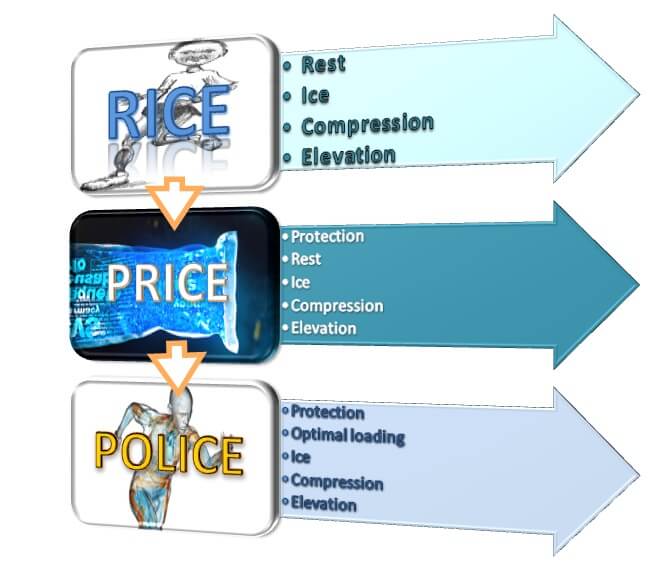RICE vs POLICE – What do I do?
Have you always wondered whether to put an ice pack on your injury? Or if you should be resting? You may have been told to follow the R.I.C.E protocol for managing injuries such as ankle sprains, knee injuries, etc. For those who aren’t familiar with it, R.I.C.E stands for:
Rest
Ice
Compression
Elevation
The ‘rest’ component of R.I.C.E is beneficial for the first 24-48 hours of acquiring the injury to allow for healing. However recent studies have shown that complete rest for longer than 48 hours can actually cause more harm than good, as it results in joint stiffness and weakness. In addition to this, increased rest time causes adaptation and compensation at neighbouring joints causing a change in biomechanics. This increases the chances of re-injury and can also cause pain/injury in other areas of the body. For this reason, R.I.C.E is no longer the recommended protocol to follow.

P.O.L.I.C.E – The new and improved protocol for soft tissue injuries:
Protection: Aimed at reducing the risk of further damaging the injured area by using assistive devices such as crutches or wearing a brace. This way, you can avoid complete rest as dictated by the R.I.C.E protocol and still move while protecting the area.
Optimal loading: This component refers to the recommendation that you start gentle movement of the injured area. Your practitioner can guide you through a series of exercises that progressively load the area to create optimal healing. This can prevent issues such as muscle tightness or muscle wasting that result from too much rest.
Ice: Applying ice to the injured area for 15 minutes every 2 hours helps relieve pain and prevents swelling. Don’t forget to put a towel between the ice pack and your skin to avoid an ice burn.
Compression: Gently compressing the injured area with a bandage helps to minimise swelling by preventing a build-up of fluid. Just make sure you check for any skin colour changes or pins and needles as it may be on too tight.
Elevation: If possible, elevate the injured area above the level of your heart as it will allow the fluid to drain away from the area and be filtered out through your lymphatic system.
Every injury is different and in cases of severe injuries, resting the injured area for longer than 48 hours will be indicated. If you are unsure of the right management for your injury, give the clinic a call on 9683 1110.
